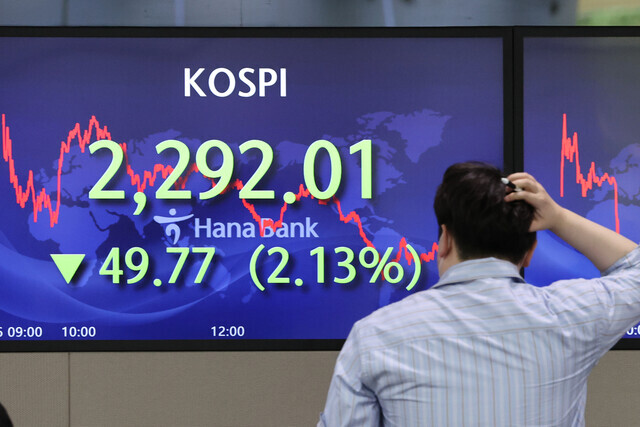hankyoreh
Links to other country sites 다른 나라 사이트 링크
KOSPI hits 20-month low as won continues to depreciate against US dollar

With concerns of a recession rattling the international community, the domestic financial market in South Korea took a major hit as well. The KOSPI fell below 2,300 for the first time in one year and eight months, and the won-dollar exchange rate topped the 1,310-won mark during trading — both stock prices and the exchange rate barreling towards a vicious cycle.
On Wednesday, the KOSPI closed at 2,292.01, 49.77 points or 2.13% lower than the previous day’s closing price. The last time the KOSPI closed at a price below 2,300 was Oct. 30, 2020, when it closed at 2,267.15. After falling below 2,400 roughly a month ago on June 20, the KOSPI further retreated below 2,300.
Meanwhile, the KOSDAQ closed at 744.63, 6.32 points or 0.84% lower than the previous day’s figure.
Wednesday saw foreign traders selling in great quantities after hesitating the previous day. Foreign and institutional investors each recorded net sales of 315.1 billion won and 623.5 billion won — around US$242 million and US$479 million, respectively — in the securities market, while private investors bought 897.2 billion won in securities. After five consecutive days of more selling than buying, foreign investors recorded a net purchase of 135 billion won on Tuesday, but switched back to netting more sales on Wednesday.
Foreign investors seem to be departing the South Korean financial market with accelerating speed. Foreigners’ net sales in the domestic stock market recently surpassed 20 trillion won, with the figure for June alone exceeding 6.3 trillion won. The share of stocks owned by foreign investors calculated from stock prices hit 27.42% on June 5, 2.1 percentage points lower than the figure from late last year.
The stock market’s effect on the exchange rate is adding to concerns about market trends. Foreign investors leaving the domestic stock market can in itself weaken the value of the won even more. This is because foreign investors offloading domestic stocks and converting their earnings into dollars before leaving the Korean market can pressure the exchange rate to rise. The won-dollar exchange rate at the foreign exchange market in Seoul jumped as high as 1,311.0 won per 1 dollar Wednesday morning after concerns of an incipient recession headed for Europe started to hit newsstands.
Investor unease has further deepened as the exchange rate continues to rise despite proactive defensive measures taken by foreign exchange authorities. South Korea’s foreign exchange reserves figures, which were announced one day earlier, also seem to have heightened worries among investors.
According to the Bank of Korea, South Korea’s foreign exchange reserves amounted to US$438.28 billion last month, a decrease of US$9.43 billion from May’s figure. The last time South Korea’s foreign exchange reserves decreased to a similar extent was in November 2018, when the country lost US$11.75 billion during the global financial crisis.
In other words, although authorities proactively intervened by selling its dollars, the won-dollar exchange rate topped the 1,300 won per dollar mark.
The domestic financial market is expected to be affected by whether concerns of a recession in the US as well as Europe become reality. Daishin Securities analyst Kong Dong-rak commented: “The concern that the eurozone will be the first to record a negative growth rate is becoming increasingly likely,” adding, “This means that the negative effect of increased interest rates in the future will be even more significant, so the economy may worsen more than previously thought.”
By Lee Jae-yeon, staff reporter
Please direct questions or comments to [english@hani.co.kr]

Editorial・opinion
![[Column] When ‘fairness’ means hate and violence [Column] When ‘fairness’ means hate and violence](https://flexible.img.hani.co.kr/flexible/normal/500/300/imgdb/original/2024/0516/7417158465908824.jpg) [Column] When ‘fairness’ means hate and violence
[Column] When ‘fairness’ means hate and violence![[Editorial] Yoon must stop abusing authority to shield himself from investigation [Editorial] Yoon must stop abusing authority to shield himself from investigation](https://flexible.img.hani.co.kr/flexible/normal/500/300/imgdb/original/2024/0516/4417158464854198.jpg) [Editorial] Yoon must stop abusing authority to shield himself from investigation
[Editorial] Yoon must stop abusing authority to shield himself from investigation- [Column] US troop withdrawal from Korea could be the Acheson Line all over
- [Column] How to win back readers who’ve turned to YouTube for news
- [Column] Welcome to the president’s pity party
- [Editorial] Korea must respond firmly to Japan’s attempt to usurp Line
- [Editorial] Transfers of prosecutors investigating Korea’s first lady send chilling message
- [Column] Will Seoul’s ties with Moscow really recover on their own?
- [Column] Samsung’s ‘lost decade’ and Lee Jae-yong’s mismatched chopsticks
- [Correspondent’s column] The real reason the US is worried about Chinese ‘overcapacity’
Most viewed articles
- 1Could Korea’s Naver lose control of Line to Japan?
- 2[Column] Welcome to the president’s pity party
- 3[Column] US troop withdrawal from Korea could be the Acheson Line all over
- 4Naver’s union calls for action from government over possible Japanese buyout of Line
- 5[Editorial] Korea must respond firmly to Japan’s attempt to usurp Line
- 6Korea cedes No. 1 spot in overall shipbuilding competitiveness to China
- 7[Editorial] Yoon must stop abusing authority to shield himself from investigation
- 8[Column] When ‘fairness’ means hate and violence
- 9Korean opposition decries Line affair as price of Yoon’s ‘degrading’ diplomacy toward Japan
- 10Second suspect nabbed for gruesome murder of Korean in Thailand, 1 remains at large